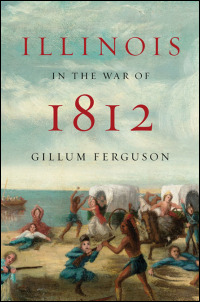 On February 27, 2012, we will publish Gillum Ferguson’s book Illinois in the War of 1812. Throughout this bicentennial year Ferguson will travel to museums, libraries, bookstores, and historical societies across the State of Illinois to share his knowledge of the War. Below he discusses who won and why we should care.
On February 27, 2012, we will publish Gillum Ferguson’s book Illinois in the War of 1812. Throughout this bicentennial year Ferguson will travel to museums, libraries, bookstores, and historical societies across the State of Illinois to share his knowledge of the War. Below he discusses who won and why we should care.
Q: What prompted the writing of this book?
A: When doing research for an article about an early settler, I discovered that, aside from a long journal article in 1904, nobody had ever attempted to tell the whole story of what had happened in Illinois during the War of 1812. I set out to write the book I was looking for, and in so doing discovered that there was much good material that no previous historian had brought to light. My objectives were twofold: first, to determine what had happened and, second, to be fair to both sides in the conflict.
Q: What was the War of 1812, and why should we care about it?
A: Sometimes the war used to be called the “Second War of American Independence,” and it wasn’t a bad name. Although the Revolution established the independence of the U.S. in the minds of Americans, the powers of Europe, especially Great Britain, but also Napoleonic France, still viewed the country with a colonialist mentality. They felt free, when it suited them, to interfere with American commerce, to pluck sailors off U.S. flag ships in international and even in U.S. waters, to occupy forts on U.S. soil, to tamper with the Indian tribes, and to engage in the Indian fur trade as if the U.S.-Canada did not exist. In the War of 1812 the new nation proved to the world that it could be pushed only so far before it would fight and that it would fight to protect its rights as an independent nation.
Q: Who won the War of 1812?
A: That is a question that historians still argue about, and the answer depends on your definition. On land, the British won more victories but the U.S. clearly won the biggest battle of the war, the Battle of New Orleans, which destroyed a veteran British army sent to invade the South. By sea, Americans won spectacular victories, but numbers told, so eventually the Royal Navy clamped a blockade on our coast that the U.S. was unable to break. At the end of the war the British controlled Northern Michigan, Wisconsin, Eastern Maine, and points along the New York border, but the U.S. controlled the lower Great Lakes and parts of Ontario, including the British stronghold of Malden (Amherstburg). The peace treaty didn’t eliminate any of the abuses that had led the U.S. to declare war, but the British never renewed them.
 Q: What was the role of the war in the history of Illinois?
Q: What was the role of the war in the history of Illinois?
A: At the outbreak of war, Illinois was a newly-organized territory with a non-Indian population of a little over 12,000. Most of those few settlers were engaged in subsistence farming within about twenty miles of the Wabash, Ohio, and lower Mississippi Rivers. The population of the Indians was probably little more than that of the Americans and was concentrated in the northern half of the state. By 1818 Illinois was populous enough and confident enough to seek and obtain admission as a state. Two major events had brought about that transformation: the War of 1812 and the sale of the public lands, but it was the first that made the second possible.
Q: What was the position of Chicago in 1812?
A: Chicago sat on a major travel route between the Great Lakes and the Illinois River system. Fort Dearborn guarded that route. It was garrisoned by about fifty-four soldiers and outside the fort was a tiny civilian community, consisting of a few small farmers, some Indian traders, and a few discharged soldiers. All around them were the Potawatomi Indians, most of them friendly enough, but every year growing less so. Mail came from Fort Wayne once a month, but otherwise Fort Dearborn was so remote and so isolated that Illinois governor Ninian Edwards wasn’t even sure whether it lay in his territory.
Q: What happened in Chicago when war broke out?
A: On August 15, 1812, the men, women, and children of Chicago marched out of the gates of Fort Dearborn and into a massacre. With the outbreak of war, most of the tiny American community attempted to evacuate to Fort Wayne and then to Detroit. They were less than two miles from the fort when their escort of supposedly friendly Potawatomi attacked them. Out of a party of just under 100 Americans, over half the soldiers, twelve out of thirteen civilian men, two women, and twelve children were killed in the attack. The surviving troops surrendered with a promise that their lives would be spared, but the wounded were killed immediately and the rest of the prisoners were distributed among the Indian bands that had taken part in the attack. Many of the prisoners were treated cruelly and quite a few of them died before they could be ransomed.
